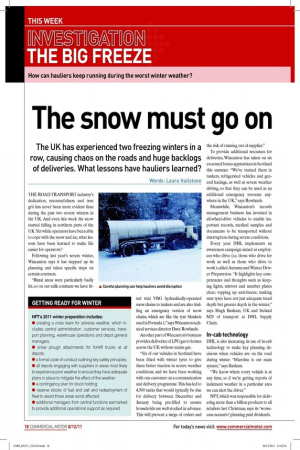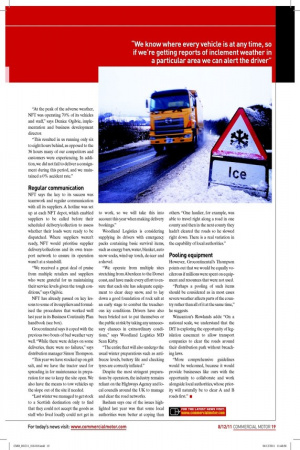The snow must go on
Page 12

Page 13

If you've noticed an error in this article please click here to report it so we can fix it.
The UK has experienced two freezing winters in a row, causing chaos on the roads and huge backlogs of deliveries. What lessons have hauliers learned?
Words: Laura Hailstone
THE ROAD TRANSPORT industry’s dedication, resourcefulness and true grit has never been more evident than during the past two severe winters in the UK. And even this week the snow started falling in northern parts of the UK. Yet while operators have been able to cope with the snow and ice, what lessons have been learned to make life easier for operators?
Following last year’s severe winter, Wincanton says it has stepped up its planning and taken speciic steps on certain contracts.
“Rural areas were particularly badly hit, so on our milk contracts we have it ted trial VBG hydraulically-operated snow chains to tankers and are also trialling an emergency version of snow chains, which are like the tyre blankets used in Formula 1,” says Wincanton technical services director Dave Rowlands.
Another part of Wincanton’s business provides deliveries of LPG gas to homes across the UK without mains gas.
“Six of our vehicles in Scotland have been itted with winter tyres to give them better traction in severe weather conditions, and we have been working with one customer on a communication and delivery programme. This has led to 4,500 tanks that would typically be due for delivery between December and January being pre-illed to ensure households are well stocked in advance. This will prevent a surge of orders and the risk of running out of supplies.” To provide additional resources for deliveries, Wincanton has taken on six ex-armed forces apprentices in Scotland this summer. “We’ve trained them in tankers, refrigerated vehicles and general haulage, as well as severe weather driving, so that they can be used as an additional emergency resource anywhere in the UK,” says Rowlands.
Meanwhile, Wincanton’s records management business has invested in all-wheel-drive vehicles to enable important records, medical samples and documents to be transported without interruption during severe conditions.
Every year DHL implements an awareness campaign aimed at employees who drive (i.e. those who drive for work as well as those who drive to work) called Autumn and Winter Driver Preparation. “It highlights key competencies and thoughts such as keeping lights, mirrors and number plates clear; topping up anti-freeze; making sure tyres have not just adequate tread depth but greater depth in the winter,” says Hugh Basham, UK and Ireland MD of transport at DHL Supply Chain.
In-cab technology
DHL is also increasing its use of in-cab technology to make key planning decisions when vehicles are on the road during winter. “Microlise is our main system,” says Basham.
“We know where every vehicle is at any time, so if we’re getting reports of inclement weather in a particular area we can alert the driver.” NFT, which was responsible for delivering more than a billion products to all retailers last Christmas, says its ‘worsecase-scenario’ planning paid dividends. “At the peak of the adverse weather, NFT was operating 70% of its vehicles and staff,” says Denice Ogilvie, implementation and business development director.
“This resulted in us running only six to eight hours behind, as opposed to the 36 hours many of our competitors and customers were experiencing. In addition, we did not fail to deliver a consignment during this period, and we maintained a 0% accident rate.”
Regular communication
NFT says the key to its success was teamwork and regular communication with all its suppliers. A hotline was set up at each NFT depot, which enabled suppliers to be called before their scheduled delivery/collection to assess whether their loads were ready to be dispatched. Where suppliers weren’t ready, NFT would prioritise supplier delivery/collections and its own transport network to ensure its operation wasn’t at a standstill.
“We received a great deal of praise from multiple retailers and suppliers who were grateful for us maintaining their service levels given the tough conditions,” says Ogilvie.
NFT has already passed on key lessons to some of its suppliers and formalised the procedures that worked well last year in its Business Continuity Plan handbook (see box).
Grocontinental says it coped with the previous two bouts of bad weather very well. “While there were delays on some deliveries, there were no failures,” says distribution manager Simon Thompson.
“This year we have stocked up on grit salt, and we have the tractor used for spreading in for maintenance in preparation for use to keep the site open. We also have the means to tow vehicles up the slope out of the site if needed.
“Last winter we managed to get stock to a Scottish destination only to ind that they could not accept the goods as staff who lived locally could not get in to work, so we will take this into account this year when making delivery bookings.” Woodland Logistics is considering supplying its drivers with emergency packs containing basic survival items, such as energy bars, water, blanket, auto snow socks, wind-up torch, de-icer and a shovel.
“We operate from multiple sites stretching from Aberdeen to the Dorset coast, and have made every effort to ensure that each site has adequate equipment to clear deep snow, and to lay down a good foundation of rock salt at an early stage to combat the treacherous icy conditions. Drivers have also been briefed not to put themselves or the public at risk by taking any unnecessary chances in extraordinary conditions,” says Woodland Logistics MD Sean Kirby.
“The entire leet will also undergo the usual winter preparations such as antifreeze levels, battery life and checking tyres are correctly inlated.” Despite the most stringent preparations by operators, the industry remains reliant on the Highways Agency and local councils around the UK to manage and clear the road networks.
Basham says one of the issues highlighted last year was that some local authorities were better at coping than others. “One haulier, for example, was able to travel right along a road in one county and then in the next county they hadn’t cleared the roads so he slowed right down. There is a real variation in the capability of local authorities.”
Pooling equipment
However, Grocontinental’s Thompson points out that we would be equally vociferous if millions were spent on equipment and resources that were not used.
“Perhaps a pooling of such items should be considered as in most cases severe weather affects parts of the country rather than all of it at the same time,” he suggests.
Wincanton’s Rowlands adds: “On a national scale, we understand that the DfT is exploring the opportunity of legislation easement to allow transport companies to clear the roads around their distribution park without breaching laws.
“More comprehensive guidelines would be welcomed, because it would provide businesses like ours with the opportunity to collaborate and work alongside local authorities, whose priority will naturally be to clear A and B roads irst.” ■
FOR THE LATEST NEWS VISIT:
www.commercialmotor.com










































